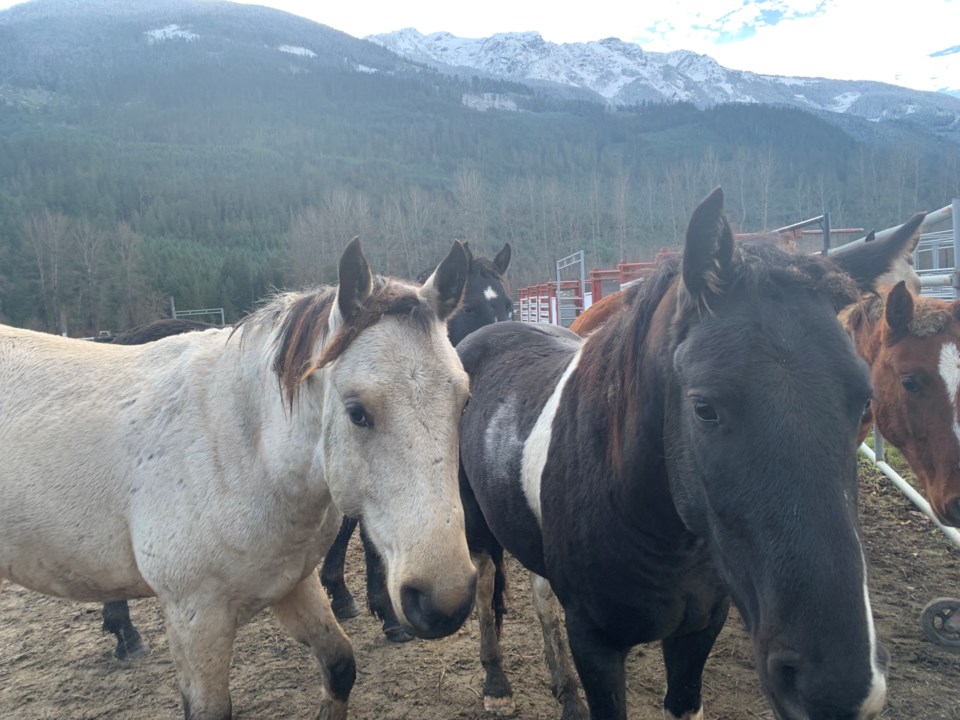The decades-long challenge of roaming horses on Highway 99, just north of Pemberton, is once again on drivers’ minds.
A Dec. 8 Facebook post from Mike Roger shows dozens of horses on the highway, late at night, milling about.
“We’ve all heard about the horses on the road but many who don’t travel north of town late at night have no idea how bad the situation is. This is a regular occurrence on my late-night commute. They are so used to vehicles they don’t get spooked,” he said.
“Anywhere else this situation would be addressed but it’s gone on for as long as I can remember.”
The Pemberton detachment of the RCMP reports at least one collision with a horse on the highway.
“Pemberton RCMP has received one call in the past month regarding a motor vehicle making contact with a horse on the highway,” said Sgt. James Gilmour in a statement. “This incident caused minor damage to the vehicle and the horse was not found, so was deemed to be not injured and walked away.”
It’s unclear whether the horse belonged to the larger group of horses that sometimes occupy the highway. Those horses are owned by resident Wayne Andrews, a former cowboy and rodeo rider from the Lil’wat Nation.
Andrews’ horses have been at the centre of a lengthy jurisdictional push-and-pull between him, animal welfare groups and local, tribal and provincial governments.
Earlier in 2024, letters were sent to Pemberton’s mayor and council, which then voted to advance the concerns raised therein to the SPCA, former Sea to Sky MLA Jordan Sturdy, the Lil’wat Nation, and the former B.C. Ministry of Transportation.
In March, then-MLA Sturdy gave a graphic speech to the BC Legislative Assembly. He described the aftermath of a collision with horses just outside of his North Arm Farm last fall.
“I pulled out of the driveway in the morning and immediately saw the red and blue lights of the RCMP eerily illuminating dead horses’ guts, bones and blood spread across the highway,” he said. “We learned later that two other horses had wandered off to die alone. A dozen horses have been killed in the last year or so. Many more have been killed over the last decade.”
Roxanne LeBlanc-Sanfaçon is a Pemberton resident and local business owner. She commutes on that part of the highway regularly, and says the horses are a near-constant presence.
“[It’s] less of an issue when they are on-reserve as the speed limit is 30km/h, but very dangerous where the speed limit is 80km/h,” she said.
Sturdy was one of the people pushing for a reducton in speed limits on the road. He’s previously said his request to reduce the speed limit to 60km/h on that particular stretch of road has so far been refused.
Large signage was recently installed indicating the horses’ presence. LeBlanc-Sanfaçon said it’s not doing enough to resolve the issue.
“They put up that large road sign that says, ‘caution, horses for the next five kilometres,’ when everyone already knows they are there,” she said.
Part of the issue, said Pemberton Mayor Mike Richman, is jurisdiction. The Village of Pemberton doesn’t exclusively manage the highway, and lacks the resources to fully deal with the horses.
“The horses roam from Lil’wat to [Squamish-Lillooet Regional District] to Village of Pemberton lands onto the public highway, which is where the big safety concern is,” said Richman. “It’s a provincial highway that’s managed under the authority of the Ministry of Transportation, so it’s a little tough that way.”
Richman expects the horses to be a topic of conversation when he and council meet with new MLA Jeremy Valeriote in January.
In the meantime, he says drivers need to be aware of the presence of the horses, and drive accordingly.
“Unfortunately, the horses aren’t going away today,” he said. “We know they’re out there right now, so the first thing that we need to do is be aware, be careful.”




